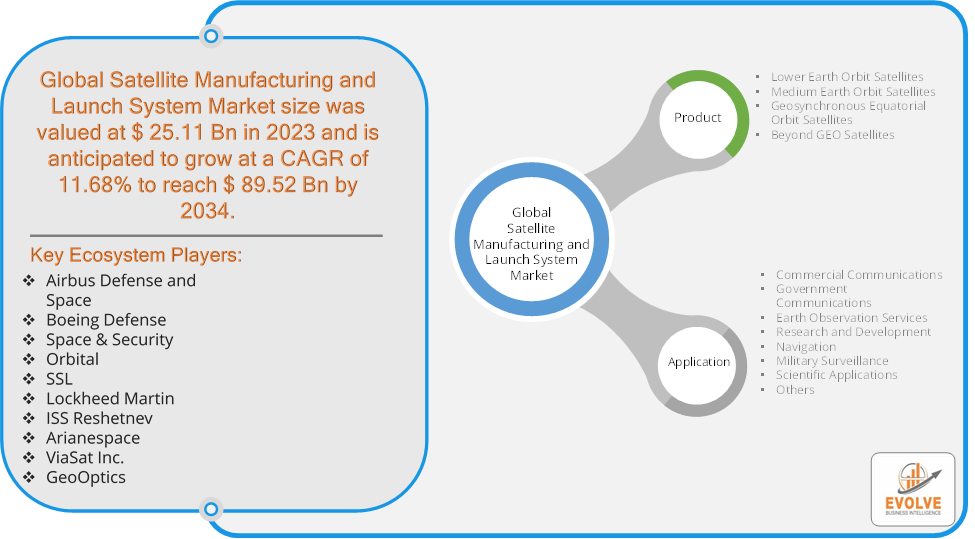Blog
Satellite Manufacturing Market Surges: 11.68% CAGR

Evolve Business Intelligence has published a research report on the Global Satellite Manufacturing and Launch System Market, 2021–2034. The global Satellite Manufacturing and Launch System Market is projected to exhibit a CAGR of around 11.68% during the forecast period of 2021 to 2034.
Evolve Business Intelligence has recognized the following companies as the key players in the global Satellite Manufacturing and Launch System Market: Airbus Defense and Space, Boeing Defense, Space & Security, Orbital, SSL, Lockheed Martin, ISS Reshetnev, Arianespace, ViaSat Inc. and GeoOptics.
 More Information: https://evolvebi.com/report/satellite-manufacturing-and-launch-system-market-analysis/
More Information: https://evolvebi.com/report/satellite-manufacturing-and-launch-system-market-analysis/
Market Highlights
The Global Satellite Manufacturing and Launch System Market is projected to be valued at USD 89.52 Billion by 2034, recording a CAGR of around 11.68% during the forecast period. The satellite manufacturing and launch system market encompasses the design, production, and deployment of satellites and the vehicles used to launch them into orbit. It’s a crucial component of the space industry, providing essential services for communication, navigation, remote sensing, and scientific research.
This market is driven by the growing demand for satellite services, technological advancements, and increasing investments from both government and private sectors. Factors such as the miniaturization of satellites, the rise of reusable launch vehicles, and the emergence of private space companies are also shaping the market dynamics.
Segmental Analysis
The global Satellite Manufacturing and Launch System Market has been segmented based on Product Type and Application.
Based on Product Type, the Satellite Manufacturing and Launch System Market is segmented into Lower Earth Orbit Satellites, Medium Earth Orbit Satellites, Geosynchronous Equatorial Orbit Satellites and Beyond GEO Satellites. The Lower Earth Orbit Satellites segment is anticipated to dominate the market.
Based on Application, the global Satellite Manufacturing and Launch System Market has been divided into Commercial Communications, Government Communications, Earth Observation Services, Research and Development, Navigation, Military Surveillance, Scientific Applications and Others. The Military Surveillance segment is anticipated to dominate the market.
More Information: https://evolvebi.com/report/satellite-manufacturing-and-launch-system-market-analysis/
Regional Analysis
The Satellite Manufacturing and Launch System Market is divided into five regions: North America, Europe, Asia-Pacific, South America, and the Middle East, & Africa. In North America region, the U.S. dominates the global satellite manufacturing and launch system market, driven by strong government support, significant investments, and the presence of leading companies like SpaceX, Boeing, and Lockheed Martin. The U.S. government, through NASA and the Department of Defense, heavily invests in satellite technology for communication, defense, and space exploration. The rise of private space companies and initiatives like the Artemis program further boost the market. Europe is a significant player in the satellite market, with major contributions from countries like France, Germany, and the UK. The European Space Agency (ESA) leads many initiatives, including the Galileo navigation system and Copernicus earth observation program. Companies like Airbus, Thales Alenia Space, and Arianespace are key players, focusing on satellite manufacturing and launch services. In Asia-Pacific region, China is a rapidly growing force in the satellite manufacturing and launch system market, driven by significant government investment and an ambitious space program. The China National Space Administration (CNSA) leads many satellite initiatives, including the BeiDou navigation system. China is also investing in commercial space ventures and developing its own space station. The satellite market in Latin America is emerging, with growing investments in communication and earth observation satellites. Countries like Brazil, Argentina, and Mexico are expanding their satellite capabilities to improve telecommunications, disaster management, and environmental monitoring. Regional collaboration and partnerships with international space agencies are common. The Middle East is seeing increased investment in satellite technology, particularly for communication and surveillance purposes. Countries like the UAE and Saudi Arabia are leading in satellite initiatives, with projects like the UAE’s Hope Mars mission highlighting the region’s ambitions. Africa’s satellite market is developing, with a focus on improving telecommunications, internet access, and disaster management. Countries like South Africa and Nigeria are making strides in satellite technology, often through partnerships with international organizations and other countries.



